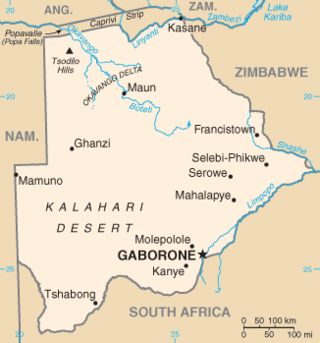
Rhodesia, officially from 1970 the Republic of Rhodesia, was an unrecognised state in Southern Africa from 1965 to 1979. During this fourteen-year period, Rhodesia served as the de facto successor state to the British colony of Southern Rhodesia, and in 1980 it became modern day Zimbabwe.

The Internal Settlement was an agreement which was signed on 3 March 1978 between Prime Minister of Rhodesia Ian Smith and the moderate African nationalist leaders comprising Bishop Abel Muzorewa, Ndabaningi Sithole and Senator Chief Jeremiah Chirau. After almost 15 years of the Rhodesian Bush War, and under pressure from the sanctions placed on Rhodesia by the international community, and political pressure from South Africa, the United Kingdom, and the United States, the Rhodesian government met with some of the internally based moderate African nationalist leaders in order to reach an agreement on the political future for the country.

The history of Rhodesia from 1965 to 1979 covers Rhodesia's time as a state unrecognised by the international community following the predominantly white minority government's Unilateral Declaration of Independence on 11 November 1965. Headed by Prime Minister Ian Smith, the Rhodesian Front remained in government until 1 June 1979, when the country was reconstituted as Zimbabwe Rhodesia.

United Nations Security Council Resolution 232 was adopted by the United Nations Security Council on December 16, 1966.
United Nations Security Council Resolution 253, adopted unanimously on May 29, 1968, after reaffirming previous resolutions, the Council noted with concern that the measures taken so far have failed to bring the rebellion in Southern Rhodesia to an end and condemned the recent "inhuman executions carried out by the illegal regime in Southern Rhodesia which have flagrantly affronted the conscience of mankind". After further condemning the regime and calling upon the United Kingdom to end the rebellion in Southern Rhodesia the Council decided that all member states would:
United Nations Security Council Resolution 314, adopted on February 28, 1972, concerned that certain states were not complying with resolution 253, the Council decided that the sanctions against Southern Rhodesia set out in 253 would remain fully in force. It also urged all states to implement fully resolution 253 and declared that any legislation passed or act taken by any state with a view to permitting the importation of any commodity from Southern Rhodesia falling into the scope of 253 would undermine the sanctions and be contrary to the state's obligations under the United Nations Charter.
United Nations Security Council Resolution 318, adopted on July 28, 1972, after reaffirming previous resolutions on the topic, the Council approved the recommendations of the committee established in resolution 253. The Council then condemned all acts violating the provisions of the previous resolutions, called upon all states continuing to have economic and other relations with Southern Rhodesia to stop immediately and demanded that all member states scrupulously carry out their obligations under the previous resolutions. The Resolution then requested the Secretary-General provide all appropriate assistance to the committee established in resolution 253.
United Nations Security Council Resolution 320, adopted on 29 September 1972, after reaffirming previous resolutions, the Council expressed concern that despite the previous resolutions, several states were covertly and overtly violating the sanctions on Southern Rhodesia. The Council requested that the committee which had been established in resolution 253, consider the type of action which should be taken "in view of the open and persistent refusal of South Africa and Portugal to implement sanctions" and asked for the report no later than 31 January 1973.
United Nations Security Council Resolution 333, adopted on May 22, 1973, after reiterating previous statements and admitting that previous measures had yet failed to bring about the end of the "illegal regime in Southern Rhodesia" the Council condemned South Africa and Portugal for failing to co-operate with the implementation of sanctions and requested that urgent action be taken to implement them. The Council then requested that states with legislation permitting importation from Rhodesia repeal it immediately and called upon states to enact and enforce legislation against any person who tries to evade of commit a breach of sanctions by:
United Nations Security Council Resolution 409, adopted on May 27, 1977, reaffirmed the Council's previous resolutions and affirmed that the policies created by them would remain in place. The Council, acting under Chapter VII, further decided that all member states should prohibit the use of funds in their territory from use by Rhodesia and/or Rhodesian citizens, save for pensions. The Resolution also decided that the Committee established in Resolution 253 (1968) should examine possible uses of Article 41 of the Charter of the United Nations.

United Nations Security Council Resolution 403, adopted on January 14, 1977, after hearing representations from the Minister of External Affairs of Botswana, condemned attacks by the "illegal minority regime" in Southern Rhodesia. The resolution recalled previous resolutions on the topic, including the right to self-determination of the people of Southern Rhodesia.

In United Nations Security Council Resolution 423, adopted on March 14, 1978, after recalling its resolutions on Southern Rhodesia, particularly 415 (1977), the Council condemned attempts by the "illegal racist regime" in Southern Rhodesia to retain power and prevent the independence of Zimbabwe. It also criticised the country's executions of political prisoners and actions against neighbouring countries.

United Nations Security Council Resolution 437, adopted on October 10, 1978, recalled Resolution 253 (1968), which prohibited Member States from allowing individuals connected to the regime in Southern Rhodesia to enter their territory. The Council noted with regret that the United States had allowed Ian Smith and other members of the "illegal regime" to enter the country, considering this action a violation of Resolution 253.

United Nations Security Council resolution 445, adopted on 8 March 1979, after recalling resolutions 253 (1968), 403 (1977), 411 (1977), 423 (1978), 424 (1978) and 437 (1978), and hearing representations from various countries, the council expressed its concern about the military operations undertaken by the "illegal regime" against countries both bordering and non-contiguous with Southern Rhodesia. The council was also indignant at the execution and sentences against persons under repressive laws.

United Nations Security Council resolution 448, adopted on 30 April 1979, after recalling resolutions 253 (1968), 403 (1977), 411 (1977), 423 (1978), 424 (1978), 437 (1978) and 445 (1979), the Council declared that the recent "sham" elections held in Southern Rhodesia by the "illegal racist regime" were illegal and the results thereof would be null and void.

United Nations Security Council resolution 455, adopted on 23 November 1979, after taking note of representations from Zambia and recalling Resolution 424 (1978), the Council expressed concern and condemned the "illegal racist regime" in Southern Rhodesia for its "sustained pattern of violations aimed at destroying the economic infrastructure" of Zambia and causing a number of deaths.
United Nations Security Council resolution 460, adopted on 21 December 1979, after taking note of the Lancaster House Agreement, the council decided to terminate measures taken against Southern Rhodesia in resolutions 232 (1966) and 253 (1968) and any subsequent resolutions. The resolution deplored the "loss of life, waste and suffering" over the past 14 years caused by the rebellion in southern Rhodesia.

Rhodesian passports were passports issued by the government of Rhodesia to its citizens for purposes of international travel. They are no longer issued, having been superseded by Zimbabwean passports in 1980, with the country's reconstitution and renaming as Zimbabwe. Rhodesian passports were ostensibly valid for travel by Rhodesians anywhere in the world, but in practice they were accepted by very few countries.

Pakistan–Somalia relations are the bilateral relations between Pakistan and Somalia. Both Organisation of Islamic Cooperation members, the two countries have historically maintained strong relations. Somalia also has an embassy in Islamabad.

The Rhodesia Information Centre (RIC), also known as the Rhodesian Information Centre, the Rhodesia Information Service, the Flame Lily Centre and the Zimbabwe Information Centre, represented the Rhodesian government in Australia from 1966 to 1980. As Australia did not recognise Rhodesia's independence, it operated on an unofficial basis.









